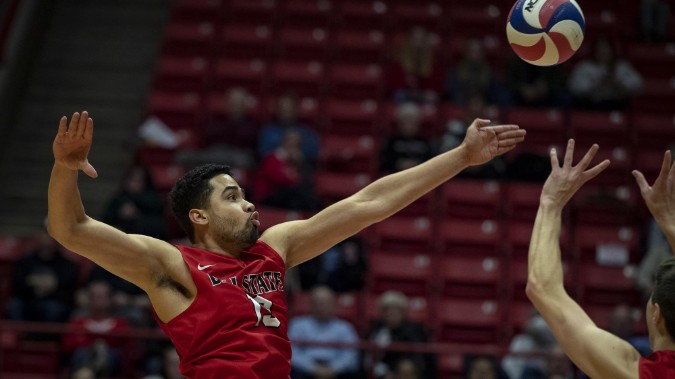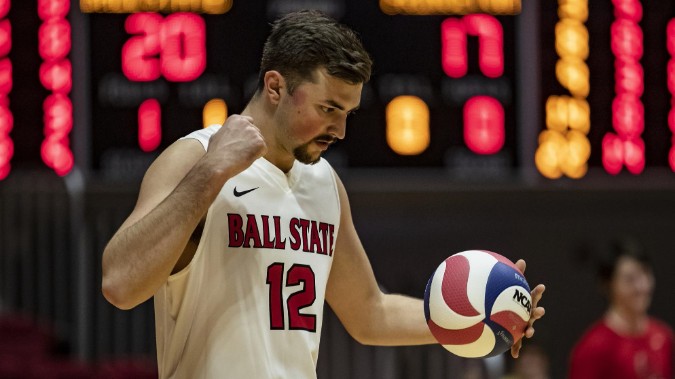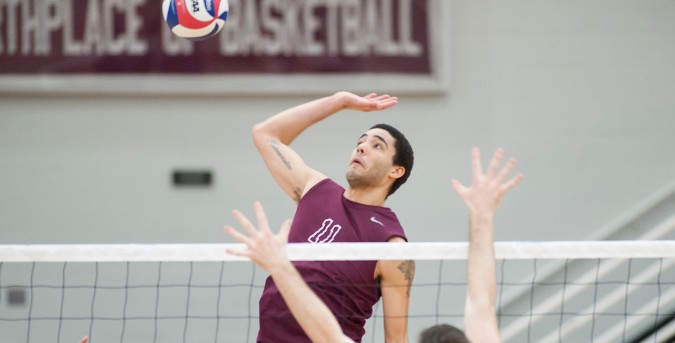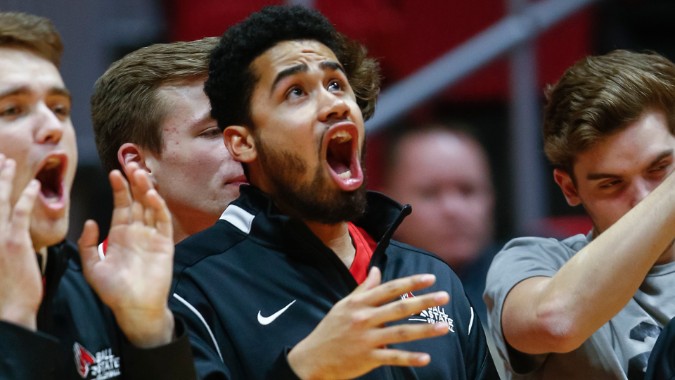
Story highlights:
Off the Block conducted a series of interviews regarding racial incidents within the Ball State men’s volleyball program that occurred from 2013 to 2018. Below are some of the findings reported in this story
- Ball State players for multiple years said the word neighbor as an euphemism for the n-word.
- Ball State coach Joel Walton in 2015 said the n-word during a team meeting when describing musical lyrics he didn’t want to hear in the locker room.
- Multiple Ball State players said the n-word in the presence of Black teammates during team parties in recent years.
- Walton in 2017 discouraged players from kneeling during the national anthem.
Lem Turner sat alone in his room.
The typical college party was taking place downstairs in his off-campus house and filled with his Ball State men’s volleyball teammates. Yet, Turner was upstairs crying.
Minutes before, a teammate standing beside Turner had just casually said the n-word in conversation.
It was the most hurtful moment for Turner during his time at Ball State. However, it was just the latest thing in a series of underlying racial incidents that Turner experienced as a member of the Ball State team.
“All the microaggressions I had dealt with up to that point and having to keep that inside of me, it brought all of those to the surface,” Turner said. “I was just sobbing by myself in my room literally asking myself ‘why I can’t be one of the guys? Why do I have to be different?’”
Turner is one of the former players Off the Block interviewed regarding a series of racial incidents that occurred within the Ball State men’s volleyball program from 2013 to 2018.
Among the incidents that multiple players corroborated include the head coach using the n-word in a team meeting and players frequently using an euphemism for the n-word. Along with the derogatory language, the coaching staff told players it expected the entire team to stand and no one should kneel for the national anthem.
THE COLLEGE EXPERIENCE
The Ball State roster each year is primarily comprised of white players.
This is similar for most college men’s volleyball programs. White players made up nearly 70 percent of the rosters for NCAA Divisions I-II men’s volleyball teams in 2019, according to the NCAA Race and Gender Demographics Database. Black players represent about 5 percent of all NCAA Division I-II men’s volleyball players.
Ball State, a historic program that was a catalyst for college men’s volleyball growing in the Midwest during the 1960s, has had minority players throughout its program history, especially in recent years.
Ball State in 2010 was one of the first programs in its conference’s recent history to have multiple Black players in its starting lineup. The Cardinals have had six Black players on their roster in the last 10 years.
Turner growing up in the Chicago suburbs was used to being one of a few if not the only Black players on his club and high school volleyball teams. The middle attacker concluded his prep career as a two-time All-Area selection and committed to Ball State.
When he arrived in the fall of 2015 to Ball State, though, he said he encountered levels of racism he never experienced before with a volleyball team.
Turner even before the start of the fall semester had already become a quasi-campus celebrity. As part of a campus welcome week event, Turner made a half-court basket on the Ball State basketball court in front of the entire freshman class to earn free tuition for a semester.
Pandemonium ensued with the crowd cheering after he made the basket and one of the first people to hug Turner in celebration was Ball State head coach Joel Walton. Days later that same coach would use a racial slur in front of Turner and the entire team.
Ball State was holding its first meeting of the season when Walton began to discuss some of his expectations, including the type of music he preferred the team play in the locker room.
“He stood up in the room and literally said I don’t want to hear the term and then said the n-word,” Turner said. “You could see everyone’s eyes go a little bit big and even the assistant coaches put their heads down and shook their head.”
Turner was the only Black player on Ball State’s roster during the 2015-2016 school year.
Former Ball State All-MIVA setter Jake Romano, who was in that meeting and was the freshman roommate of Turner, confirmed to Off the Block that Walton used the n-word. Turner and Romano, though, said they do not recall Walton using the n-word any other time while they were at Ball State.
Turner said assistant coaches Kevin Furnish and Jim Pallalonis later addressed the team about how “ridiculous” it was for Walton to say the n-word. Walton, though, never addressed the team or apologized for using the n-word, Turner said.
Walton, who has accumulated more than 400 career wins in 22 seasons as the Cardinals head coach, did not respond to Off the Block’s request for an interview.
Turner at the time did not report Walton’s use of the n-word to anyone in the athletics department.
SUBSTITUTE FOR THE N-WORD
Turner continued that first semester at Ball State training with the team and decided to redshirt for the 2016 season. He quickly became a beloved teammate, especially for all-conference middle attacker Matt Walsh.
“Lem was one of the best teammates I ever had,” Walsh said. “He was usually on the other side of the net [during practice]. We would just talk so much smack to each other and just laugh so much during practice. He was one of the main reasons that I loved going to practice.”
Walsh and Turner developed a friendship that extended beyond their time at Ball State. However, as Turner began to spend time with more of his teammates he realized some of the racist undertones in the program.
Turner said throughout that fall semester he would often hear teammates saying the word neighbor. He said he realized after hearing his teammates sing along to songs that neighbor was a word they would substitute for the n-word.
The team’s usage of neighbor extended beyond singing. Ball State players would often use the euphemism during practices and matches, Turner said.
“I did feel very uncomfortable, but at the same time didn’t know how do I tell someone,” Turner said. “I was afraid they wouldn’t take me seriously as a freshman.”
Ball State players had been using neighbor as a substitute for the n-word prior to that 2015-16 school year.
Former middle attacker and current Howard women’s volleyball assistant coach Julian Welsh-White said the term neighbor was frequently used by his teammates when he played on Ball State from 2012-15. Welsh-White said Ball State players came up with substitute terms for the n-word starting his sophomore year and that continued throughout his time on the team.
“Back then it was Mondays. Like, oh everyone hates Mondays and everyone else hates Black people. So they just started saying instead of I hate Black people, everyone hates Mondays,” Welsh-White said.
Welsh-White concluded his time at Ball State before Turner joined the team. For his first three seasons, Welsh-White was one of a few Black players on the roster.
The white players on Ball State who used the term Mondays, Welsh-White said, were careful when they used the term. The former player said they were afraid to say it in front of their other Black teammate Larry Wrather.
Wrather is now the head coach at Fort Valley State, a NCAA Division II historically black university that will start a men’s volleyball program in 2022. Wrather said in an interview with Off the Block that he did not recall hearing his Ball State teammates using the derogatory term around him.
After Wrather graduated in 2014, Welsh-White was the only Black Ball State player on the roster and said his teammates started to frequently use the term neighbor. Welsh-White said the term neighbor had such widespread use on the team that all the players were aware of its meaning.
“Everyone knew. Everyone was aware of what was happening. Everyone was aware of what was going on,” he said. “I didn’t know what to do about it. I didn’t want to go and tell on everybody because I felt like these were still some of my friends, but then I thought to myself what kind of friends would sit here and say this in the locker room, in practice, hanging out outside of volleyball.”
Both Turner and Welsh-White said they felt isolated on the team and started to distance themselves from their teammates because of the hurtful language.
The usage of neighbor contributed to Welsh-White transferring from Ball State to Springfield for his final season. Welsh-White, after backing up several All-American middle attackers while at Ball State, earned All-American honors himself and helped lead Springfield to the Division III NCAA Tournament finals.
Welsh-White said his one season at Springfield was a stark contrast to the racial ignorance he experienced at Ball State.
“At Springfield they were the complete opposite,” he said. “Everyone was very opening and welcoming and loving. We were one unit at Springfield and that’s what so different about other programs and Springfield.”
Similar to Welsh-White, Turner said the derogatory term about his ethnicity made him feel like an outsider among his Ball State teammates. He also said he stopped hanging out with his teammates away from the court during his freshman season because of their usage of the word neighbor.
Ball State concluded the 2016 season with an upset loss to McKendree in the MIVA Tournament quarterfinals.
Days after the season-ending loss that Turner spoke to Walton and the rest of the coaching staff about his teammates using the term neighbor.
During an annual end-of-season interview, Turner told coaches about the use of neighbor as a substitute for the n-word and how he felt isolated from the team. He also told the coaches how the upperclassmen had started to address all freshmen players as neighbors.
Turner said the coaching staff was shocked by these revelations, despite the term being so frequently used by the players throughout the season.
“It would almost be negligent for them to not know the team was using the term neighbor,” Turner said. “I don’t think they kind of paid attention enough to realize that whenever a song had the n-word in it that they supplemented it with neighbor.”
Ball State coaches following this conversation acted swiftly to address the team using the word neighbor.
The next day the coaching staff called a mandatory team meeting, which is unusual given that the season was over. Along with the players and coaches in attendance, an associate athletics director and the school’s associate provost for diversity came to address the team.
“[They] talked to the team about racism and discrimination and pretty much gave them a tongue lashing,” Turner said.
Players, after the 20-minute meeting, went to their locker room where they began to talk among themselves. Turner said it quickly became apparent to his teammates that he was the one who brought this to the coaches attention so he decided to explain why he did it.
“I felt like I didn’t have a place here to say something. So, I felt like I had no choice but to talk to the coaches,” Turner said. “I was telling them how it made me feel awful, less than and all that. I remember breaking down and crying in the middle of the locker room.”
It was at that moment when Romano realized just much how using the term neighbor had hurt Turner. Even living with Turner for the season, Romano said it was something the two never discussed before that moment and regrets not understanding earlier what Turner was experiencing.
“I was extremely naive,” Romano said. “When you are the young kid on the team and trying to fit in any sort of social setting you typically fall into what the group does to try to fit in. Even back then there were times where I myself found myself falling into that culture and taking a part of it just to fit in. Meanwhile, Lem is sitting in the back of the room being totally silent and no one realizes the kind of gravity that held at the time.”
Walsh said the team felt horrible when they heard Turner explain why the term neighbor was so hurtful. He also said the speech was memorable because Turner had struggled to find his voice on a team with a lot of upperclassmen.
“It was so emotional and powerful that he did that, especially as a freshman,” Walsh said.

A TRUE CULTURE CHANGE?
While Turner provided that emotional moment in the locker room, he said the coaching staff opted not to implement any additional consequences for players who used the term neighbor. Turner said the coaching staff was committed to keeping the incident internal.
The term neighbor in subsequent years was no longer common vocabulary for Ball State players. However, Turner said he would occasionally hear teammates using the term out of habit but catching themselves.
Whether Ball State men’s volleyball had a true culture change to eliminate racism after university officials addressed the team depends on the player asked.
Romano and Walsh said the culture did get better during the upcoming seasons. Turner, though, said there was no real change.
Walsh, who is now on the Indiana women’s volleyball coaching staff, said he learned a lot from the experiences of that 2016 season and it has helped him as a coach and a person.
“It made you realize how anything that anyone says can be perceived differently,” Walsh said. “As a white man, if they said [neighbor] to me it didn’t bother me. It wasn’t derogatory towards me, but then Lem was one of my good friends on the team, and I had no idea that he felt that way.”
Walsh also said the coaching staff made efforts following the 2016 season to make sure that there were not any problems among the players on the team.
The coaching staff encouraged Walsh as a team captain during the 2018 season to spend one-on-one time with teammates and take them out of dinner if they sensed there may be a problem. Walsh also said he made a conscious effort to help bring the entire team together and keep the coaches aware of any issues they needed to know about.
“They didn’t want a repeat of that [2016 season] where a freshman was too scared or not willing to speak up about it,” Walsh said.
Romano concluded his college career in 2020 and said he felt the program experienced a culture change. The setter said it became the expectation if players witnessed a racial incident to confront the situation and take accountability to make sure it didn’t happen again.
“With Lem’s bravery coming forward the upperclassmen realized this is not what we can stand for anymore,” Romano said.
Turner credited both Walsh and Romano for working to improve the culture. He also said, though, the meeting to address the term neighbor only resulted in a few players changing their behaviors in subsequent years.
“In terms of an entire team culture change, no, not at all,” Turner said. “They still would say insensitive and racially incentivized things. It’s just they would kind of be a little more quiet or like would not do it around me to pay respect to me. I think that is where there was still a misunderstanding of the issues of oh Lem heard it, not that we’re saying it.”
Ball State players as part of an athletics department initiative participated in unconscious bias training during the 2016-17 school year.
Walton and his coaching staff also arranged for Princeton coach Sam Shweisky to speak to the team about a variety of social issues including racism. Shweisky has been a leader in the college men’s volleyball community to eliminate teams having a toxic masculinity environment and spearheaded the efforts this summer for the EIVA, the East Coast conference that Princeton is a part of, to start a diversity council.
STANDING IS THE EXPECTATION
Turner said he lost his confidence in the Ball State coaching staff to address racial problems on the team following an incident the night of the 2017 home opener.
Minutes before Ball State was slated to play Saint Francis, Turner said, Walton walked into the locker room and told the Ball State players he expected them to stand for the national anthem.
Former San Francisco quarterback Colin Kaepernick started kneeling in September 2016 to protest police brutality against the Black community. Other athletes in multiple sports joined his form of protest by kneeling during the national anthem.
Turner for that 2017 season remained the only Black player on the Ball State roster.
Walton prior to speaking to the team did not approach Turner to ask if he was thinking about kneeling as a form of protest, the former player said. Turner said he had no intention to kneel during the national anthem but Walton addressing the entire team about the kneeling made him feel singled out.
A former Ball State player speaking on background confirmed to Off the Block that Walton addressed the team about standing during the national anthem. The player said Walton’s locker room address was more about his expectations for the team rather than strictly banning kneeling.
Turner said that prematch address solidified he could not go to the coaching staff again if he experienced any more racism on the team.
“I didn’t feel like the coaches were one of my allies,” Turner said.

YEARS OF MORE PAIN
There remained racial incidents between Turner and some of his white teammates throughout his final three years at Ball State
Some incidents, Turner said, were laced in stereotypes such as teammates making jokes that if more Black people played volleyball than white people wouldn’t get roster spots on college teams.
Other incidents, though, were more blatant forms of racism.
Turner said certain Ball State players when away from the court would say the n-word. One off-campus house where about five players lived together, Turner said, was known to have those players using the n-word when playing video games.
“They thought it was funny to scream it in anger,” Turner said.
Turner was not the first Black player at Ball State to experience white people using the n-word.
Welsh-White was walking by the team’s stadium as a freshman during the 2012-13 school year when he was harassed by two white men who were outside of a house.
Welsh-White said the individuals called him a “porch monkey” and used the n-word as he walked by the house. The former player said he began to talk back to the two men he did not know but then another individual intervened and encouraged Welsh-White to walk away before the situation escalated.
This was not the only racial language Welsh-White experienced while at Ball State — he also experienced it from his teammates.
Welsh-White said his teammate and friend Dan Wichmann was hosting a house party when another Ball State player in attendance started shouting the n-word. Wichmann immediately removed that teammate from the party, Welsh-White said.
Wichmann confirmed to Off the Block Welsh-White’s account of the incident.
“I’m very appreciative of Dan Wichmann for being that kind of stand-up guy and sticking up for me,” Welsh-White said. “No one else on the team did. No else in my four years there ever stood up and said this is wrong.”
This was not the last time that a Ball State player used the n-word at a team house party.
Following the incident of a player saying the n-word in Turner’s presence, Romano as a team leader called a players meeting.
Romano said he felt the need to speak up and make it clear that type of language was unacceptable.
“I knew ethically and at my core that that’s something is absolutely not right,” he said. “At the end of the day regardless of what other people think of me because of it, it’s the right thing to do, and I had to stand up for this because if I don’t no one else would.”
Despite some players working to improve the team culture, Turner said there were limited culture changes at Ball State because there were no consequences for players who engaged in racially insensitive actions.
“There weren’t any consequences for some of the key individuals that drove this culture that made me hate my freshman year by saying neighbor all the time,” Turner said. “They just kind of went about their business because they had playing time. So that’s when I realized that the coaches care a lot more about athletic skill than character.”
Welsh-White similarly said the Ball State coaching staff’s primary focus is winning and is not concerned about creating well-rounded individuals.
“The coaches purely are there to get the most athletic people,” he said. “They are not trying to build character.”
As a current NCAA Division I coach, Welsh-White said if any of his players engaged in the racist language or actions like what he experienced at Ball State those players would no longer be a part of the Howard program.
“We don’t tolerate any of that. We’re all inclusive, especially being at an HBCU,” he said.
Ball State athletics in a statement to Off the Block emphasized it is committed to creating a culture of inclusion. It also encourages players or alumni to report any racial incidents to the Director of Institutional Equity and Internal Investigations.
“At Ball State University, we are committed to a culture of diversity and inclusion. This same level of commitment is instilled in our athletics programs,” according to the statement. “We insist on and believe in a culture of respect for every member of our campus community. If a matter occurs where a student has experienced anything less than an excellent experience for which we are known, we take these matters seriously and will investigate them appropriately. If a student or alumni is concerned about issues pertaining to diversity and inclusiveness, we encourage them to contact the Director of Institutional Equity and Internal Investigations who is responsible for the intake and investigation of complaints from applicants, students and employees regarding unlawful discrimination, harassment, including sexual harassment, and/or retaliation, based upon protected class status (e.g. race, sex, age, disability, religion and others).”

A TIME TO SPEAK UP
Turner concluded his college playing career following the 2019 season.
He had one more year of eligibility remaining because of his redshirt season in 2016 but was on track to graduate before the 2020 season and opted not to return. He said he considered quitting the team before the 2019 season but was encouraged by his girlfriend and friends to play that final season.
Turner remained quiet about his experiences at Ball State until this summer.
In the wake of the killing of George Floyd by police in Minnesota and the protests for racial equity throughout the country, numerous professional and college sports teams took to social media to issue statements about the need for social equality.
The Ball State athletics Twitter account tweeted and re-tweeted messages supporting the peaceful protests. It also commended the work of Ball State basketball player Ishmael El-Amin who organized a protest on the campus.
Coaches such as a Ball State women’s volleyball coach Kelli Miller Phillips tweeted their support of this movement. In addition, the Ball State women’s volleyball team on social media re-tweeted messages from Ball State athletics about the importance of voting and the department’s new voter registration campaign “Register, Chirp, Vote.”
Turner said he was frustrated and embarrassed by inaction on the Ball State men’s volleyball social media accounts.
The Ball State men’s volleyball from June 1-20 during some of the heights of the protests had a single tweet. The re-tweet on June 9 was from the NCAA volleyball Twitter account and included a video produced by a former Ball State player for a volleyball organization. The video featured interviews with current and former Black college men’s volleyball players who shared their experiences of being Black in a predominantly white sport.
The team also posted that video on Instragram — its only post on the social media platform since May.
With non-revenue college sports like men’s volleyball, most athletics departments do not have a person whose sole focus is a single team’s social media account. Instead, it’s typically a sports information director or graduate assistant who oversees multiple accounts along with numerous other responsibilities. The coaching staff at some schools may also have some involvement in generating social media content.
It is unclear how active the Ball State men’s volleyball coaches are on the team’s social media account.
As a Ball State alumnus, Turner decided to tweet to Ball State athletics. In his tweet on June 19, Turner stated it was not enough for only the athletics department to issue a statement about social injustice and individual Ball State teams like men’s volleyball should issue statements.
Three days later Turner had yet to receive a response from his tweet and tweeted once more. This time Turner stated if Ball State athletics didn’t respond within a week he would share his story of “tokenism, racism, ignorance, and lack of accountability” while playing for Ball State men’s volleyball.
Walton was made aware of his former player’s tweets. However, Turner said Walton never reached out to him this summer before or after those tweets.
The Ball State men’s volleyball coaches in a tweet on June 26 issued a statement of support for the Black Lives Matter Movement, seven days after Turner’s initial tweet.
The statement was not on Ball State letterhead. Rather, it consisted of two images that appear to be screen shots of a message written in the Notes application on an iPhone.
In the statement, the coaches pledged “to recognize, educate, listen and confront social and racial injustices against the Black community” along with having the program committed to “defeat racism.” The coaches also pledged a zero tolerance policy for any individual on the team who engages in racist actions.
Turner said he was disappointed when he saw the statement because it was vague and did not include any specific steps on how the team was going to combat racism.
“It was more performative than anything,” Turner said.
Turner also was critical of the zero tolerance policy because there was nothing in the statement clearly defining what the coaching staff considered to be racist actions.
“These are vague statements that truly don’t have any accountability attached to them,” Turner said. “I just felt like this was freshman year all over again where someone like me can experience being racial harassed for a whole year and then [those players] only get a tongue lashing rather than get kicked off the team.”
Both Turner and Welsh-White said they are skeptical that Walton would remove a player from the team for racist actions. They also said they would not advise a minority men’s volleyball recruit to play for Ball State until there is a culture change.
Welsh-White said he feels it’s unlikely there will be a culture change at Ball State without a coaching change.
Walton, a former Ball State player, was promoted from an assistant coach to the Cardinals head coaching following the retirement of Hall of Fame coach Don Shondell. Walton is the longest tenured coach in the MIVA and last guided Ball State to a conference championship in 2002. In addition, the team under Walton has eight winning records in the last 10 seasons.
“There is not going to be a policy change if he’s been there for 20-plus years. If there hasn’t been a change in that many years I don’t see a change happening,” Welsh-White said. “That program is just waiting for someone to step in and take charge. Someone that is the right fit to change the policy and just change the atmosphere.”
[Editor’s note: I took no pleasure reporting this story. I am a proud graduate of Ball State University. Spending 2007-10 covering the Ball State men’s volleyball team is how I grew to love journalism and men’s volleyball. As a journalist and more importantly human, I felt that I had a duty to tell this story of pain and suffering. What happened to Lem and Julian is not acceptable and grossly failed to meet the high standards that I hold for Ball State. Ball State is better than this. We should all be better than this.]


 Follow
Follow
It is not that hard. You recruited the player. Learn about them, and be willing to learn from them.
Yes as a coach you can control the culture of the team to some degree. However, when you recruit a player with different backgrounds than that of your own you have to adapt to make them feel a part of the team and your culture. Using code words to get around the n-word is just sad.
Remember a coach is only as good as their players. A coach is trying to get the most out of their player. In this case, the coach did not make an attempt to not use code language or make an attempt at creating better bonds to his player. Dereliction of coaching duty here.
Thank you for sharing this awful racial injustice you faced at Ball State. No one should ever have to endure this treatment. It is a shame that we are still talking about racial injustice. I pray changes are made to this program to treat all as equals and there is no tolerance for this awful behavior. The coaches and falculty must put a stop to this. Bless you young men.